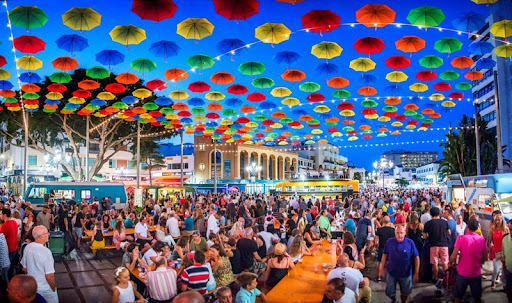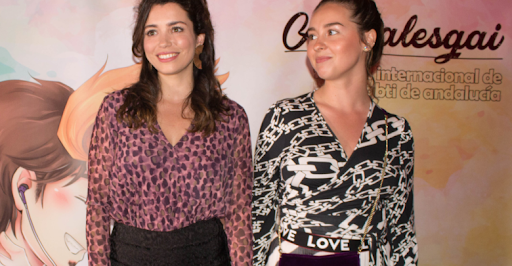Madrid and Barcelona might get more attention, but Seville — Spain’s fourth largest city — has a thriving LGBTQ+ community all its own. Take a stroll around La Alameda, the center of the action, and you’ll spot groups of queer students hanging out in the squares or same-sex couples enjoying a meal at one of small eateries with tables spilling out onto the street. The city has a relaxed vibe that makes it easy to explore.
Are you Seville-bound and LGBTQ+? Here’s everything you need to know about what the city is like, where to find like-minded people, and the year’s biggest and best LGBTQ+ cultural events.
What Attitudes Towards LGBTQ+ People are Like
If you’re an LGBTQ+ person, you’re likely to feel at home in Seville. Although it doesn’t have the bustling gay neighborhoods you’d find in larger cities, the capital of Andalusia is generally warm and welcoming.
Spain is considered to be one of the most LGBTQ+ friendly countries in the world. Polls by the Pew Research Center reveal that nearly 9 out of 10 people are accepting of queer people. Discrimination on the basis of sexual orientation has been banned nationwide since 1995.
When it comes to trans people, 87% of those polled say they should be protected from discrimination. Not all parts of the country have banned discrimination against trans people, but Andalusia has.
History of LGBTQ+ Issues in Spain
Despite a dictatorship until 1975, same-sex sexual relations were re-legalized in Spain in 1979. In 2005, Spain became the third country in the world to formally legalize same-sex marriages nationwide and in 2008, the Gender Identity Law was passed to change name and sex on legal documents, giving the LGBTQ+ population equal civil rights. Much progress has been made since then and Spanish law prevents discrimination on the grounds of sexual orientation and gender identity.
Today, a majority of Spanish people are, to varying degrees, accepting of LGBTQ+ people. Some are still against progress, and homophobia, biphobia, and transphobia still exist. However, Seville is known overall to be a safe and welcoming city for LGBTQ+ people.
The film Love & Revolution (Te Estoy Amando Locamente) was released last year, chronicling a story set in 1977 of a mother who joins the budding Andalusian LGBTQ+ rights movement when she realizes her son is gay. It has already won many awards and is a reflection of the ongoing modern-day conversations and celebrations around LGBTQ+ culture in Seville.
Neighborhoods
Alameda de Hércules
The Alameda de Hércules — which locals refer to simply as La Alameda — is a long, narrow plaza first built in 1574. Running through the historic district, it’s easy to find because of the towering columns topped by statues of Hercules and Julius Caesar. The surrounding streets have many LGBTQ+ establishments, many of them flying a rainbow flag.
La Alameda is filled with people day and night, so it feels safe for a stroll. You won’t have any trouble finding sidewalk cafes where you can stop for a cappuccino, or a tapas bar where you can fortify yourself before a night out on the town.
 Credit: Turismo de Sevilla
Credit: Turismo de Sevilla
Weekend Trips
Torremolinos
A 2½-hour drive from Seville, the beachfront community of Torremolinos has one of the most welcoming LGBTQ+ scenes in Andalusia. Located on the Costa del Sol — the Sun Coast — Torremolinos has a two extremely popular gay beaches, Eden and El Gato. It’s a great weekend destination in late spring or early fall, when the temperatures aren’t too bad. It’s sweltering in summer.
 Photo credit: Turismo Andalucia
Photo credit: Turismo Andalucia
Annual Festivals
Orgullo de Andalucía
Andalusia Pride is a weeklong celebration including a nighttime parade through the streets of Seville and a festival that fills Plaza de España with music and dancing. It’s not just a party, however. There’s a strong political focus, especially when it comes to fighting homophobia in more rural parts of Andalusia.
 Credit: Ayuntamiento de Sevilla
Credit: Ayuntamiento de Sevilla
AndaLesGai
Usually held in March and April, this LGBTQ+ film festival screens documentaries, shorts, and features from around the world. Although the name refers to lesbians and gay men, the festival doesn’t shy away from depicting a wide range of queer experiences. The opening and closing parties are great places to meet LGBTQ+ filmmakers.
 Photo credit: Andalesgai
Photo credit: Andalesgai
Feria de Abril
A colorful cultural festival, La Feria de Abril has been lighting up the city since 1846. The region’s biggest annual event, it includes a week of food and drink, carriage rides, and dancing in the streets. Every year there’s more and more of an LGBTQ+ presence at this celebration of Andalusian life.
 Credit: Sevilla Congress & Convention Bureau
Credit: Sevilla Congress & Convention Bureau
Semana Santa
During this “Holy Week,” individual members of the LGBTQ+ community in Seville are highly involved in religious processions, in spite of the Catholic church’s views on homosexuality. Many people in Spain consider themselves culturally Catholic and not practicing Catholics, and there is great devotion to religious traditions even among the LGBTQ+ community. Feel welcome to observe any of the Semana Santa processions!
Seville Resources for Members of the LGBTQ+ Community:
- DeFrente: LGBT collective focused on defending community rights and promoting education
Adhara Sevilla Checkpoint: Center that offers free STI/STD testing, support programs (in Spanish) for HIV+ individuals, organizes campaigns to raise public awareness of HIV and AIDS
Togayther: Online Seville city guide (linked) and LGBTQ+ cultural center
Asociación de Transexuales de Andalucía (ATA): Offers HIV testing, career counseling, and consultations on specific topics (legal advice, access to hormones, etc.) for trans individuals and their family members and friends
Sevilla Diversidad LGTB/Asociación de Lesbianas de Sevilla: Education, counseling (in Spanish), HIV testing, outreach for the LGBTQ+ community
Because of its history and culture, Seville is one of the best cities in Europe when you’re studying abroad. And its LGBTQ+ friendly vibe makes it a good choice whether you’re just coming out or have been out, loud, and proud for years.
Verto Education does not tolerate discrimination based on gender, sexuality, race, ethnicity, or ability. If you experience an incident of sex- or gender-based discrimination, harassment, bullying or assault, Verto encourages you to report it. You do not have to go through the experience alone. Assistance and resources are available, and you are not required to make a formal complaint or participate in an investigation to access them.
If at any point during the semester, you need to report any inappropriate activity, want to share something privately, or have a grievance, you may notify your Student Life Coordinator, Academic Success Coordinator or email [email protected].
Mental Health support is available for students in crisis via onsite and remote support services. Contact your Student Life Coordinator, Academic Success Coordinator, or email [email protected].

